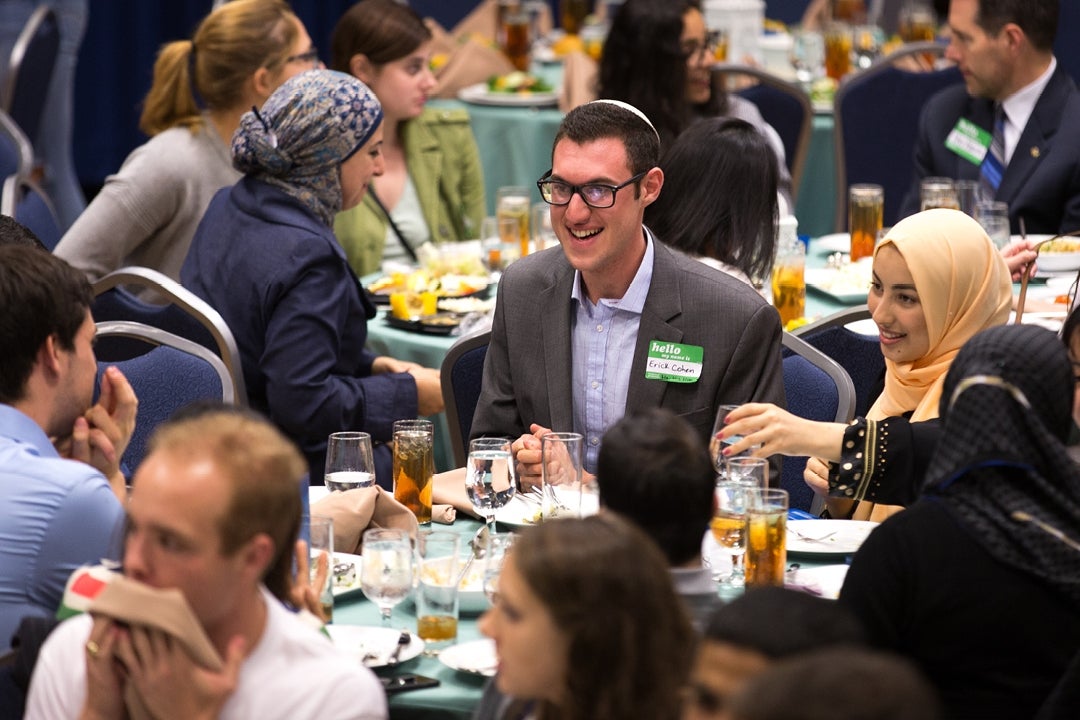When Gabriel Salguero is introduced to a crowd as Hispanic, many assume he is a Democrat. When he is introduced as an Evangelical, they assume Republican. In fact, Rev. Dr. Salguero is a registered Independent, as are 32% of the roughly 9 million Latino evangelicals in the United States.
Rev. Salguero shares all this with a twinkle in his eye because it’s not politics that drives him, but faith, theology, and conviction. Those are the same things that undergird his deep commitment to racial reconciliation. While he says Christian is his primary identity, the Reverend is also living that in brown skin, and in the reality of being a Latino in America.
“When people hear Evangelical, they think a white, Republican supporter of Donald Trump,” he says. “I want them to hear, ‘deeply committed follower of Christ who loves neighbors as they love themselves.’” He’s quick to point out that includes your Black, white, Jewish, or brown neighbor. “There is no caveat, reconciliation is based on that commandment,” he says emphatically.
Rev. Salguero is the pastor of The Gathering Place, a multi-ethnic Assemblies of God congregation in Orlando, Florida. He is also the co-founder of the National Latino Evangelical Coalition, made up of 3,000 churches, nonprofits, clergy leaders, and educational institutions. Despite the fact that Latino Evangelicals are the fastest-growing Evangelical group in the country, there is a deep political misunderstanding about where their alliances lie. But Rev. Salguero says that misunderstanding extends beyond Evangelicals or even Latinos.
“We must remind the nation that no group is homogenous—be it Catholic, Muslim, Jewish, or secular, none are a monolith,” he says. “In this diverse nation, there is great diversity among us.”
As the country recognizes Hispanic Heritage Month (September 15 – October 15), he believes it’s important to celebrate that diversity. Much like it’s important to celebrate the months that highlight our Black, female, Asian American, and Pacific Islander, and other neighbors. He’s quick to point out even among Hispanics in America, there are over 20 nations and their descendants represented.
“That great diversity is what makes the United States rich,” Rev. Salguero, who is of Puerto Rican stock, says. “It enriches us when we celebrate, when we get the faces, names, and stories of what we claim to be when at our best. It’s about E Pluribus Unum, out of many come one. It’s about the collective national conscious raising of the stories of people who live on this land.”
“When you know the history, the suffering, and the contributions of these cultures, you help evoke national empathy and solidarity,” he adds.
Solidarity became a recurring theme as the New Jersey native and father of two shared more about his work, beliefs, and life. Not because of political ideology, but because it’s what the scripture dictates. It may also be because he comes from a family of pastors. His mother (one of the first ordained Latina Pentecostal pastors) and father co-led a congregation for several decades, as he does today with his wife Jeanette, who is also the co-founder of the National Latino Evangelical Coalition.
For Rev. Salguero, it comes down to one of the most famous Bible verses, John 3:16: “For God so loved the world…” He acknowledges alone, love may sound like an abstract thought. But it needs to be concretized. Because love is what makes decisions about the treatment of people. Racial reconciliation is love and justice.
“What are the implications of love as a public virtue,” Rev. Salguero asks. “What does that mean in legislation, policing, housing, criminal justice, educational reform, budgets?”
His answer? It’s not just about holding hands and singing. It’s about returning equity or establishing it because it wasn’t there to begin with. That’s what reconciliation means to him. “I think if we don’t learn how to swim together, we will all sink together,” he says. “The health, safety, and future of my neighbor is the health, safety, and future of my children, of myself.”
While it seems like such a simple and easy concept, Rev. Salguero believes it’s made more complex by the historical distrust and the systems built to reinforce that distrust, alienating people from each other. “It’s hard because there’s an element of people feeling their own loss, that somehow by honoring someone else, they are losing because we live in systems of zero-sum games,” he says. “We’ve lost our capacity to imagine win/win scenarios, for me to win, someone else needs to lose.”
Despite that, when asked about the underestimation of Latino Evangelicals’ political astuteness when courting their vote; or the often highlighted Black versus white disparity; or his acknowledgment about the current tragic renewal of ethnocentrism and nationalism, Rev. Salguero always call attention to the broader and more empathetic view.
“There are historical inequities that have lingering impacts that must be rectified, but I think that we can say two things at the same time,” he explains. “There is a deplorable and nefarious historical reality of the African American experience in America that needs to be highlighted: segregation, chattel slavery, redlining. We can say that and simultaneously say that histories of racism in America also include, for example, the sterilization of Puerto Rican women in the 1960s; the xenophobic rhetoric towards Asian/brown immigrants; the genocide of First Nations persons. These other histories that are analogous—not identical—but they have their own stories of oppression and mistreatment.”
“It comes down to, am I willing to stand for your equal treatment, for this pluralistic society, and am I honest about the injustices that happen,” he continues. “If there is any historical inequity, we must do everything to rectify it, we must love people enough that we demand that they be treated correctly and justly.”
This month, as the nation celebrates Hispanic heritage, and in the coming months and years as the country continues to reckon with racial reconciliation, Rev. Salguero will continue to do what he does: hope.
“You can’t be in reconciliation work if you don’t believe the arc of the moral universe is long and bends towards justice,” he says. “We do our part to pull on that arc and I may not see it in my lifetime, but what other option do I have?”
If anyone can move that arc, it might just be a Hispanic, Evangelical, Independent pastor motivated by the power of love.


